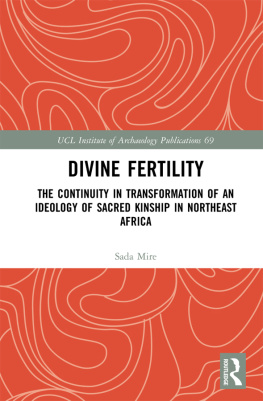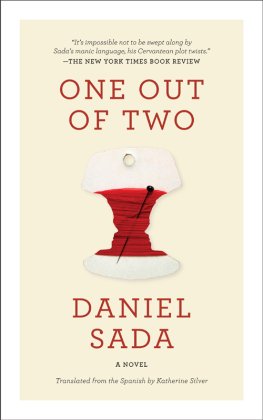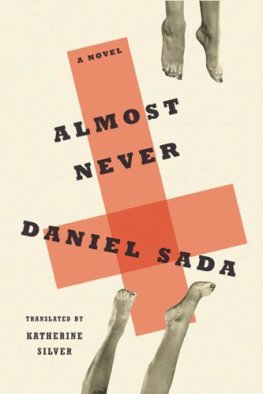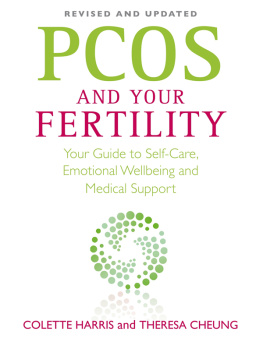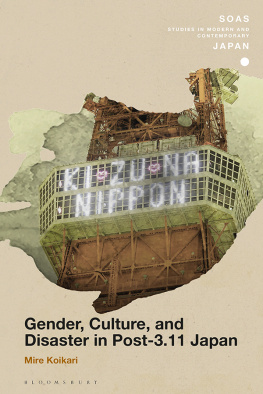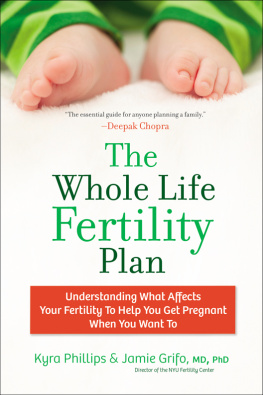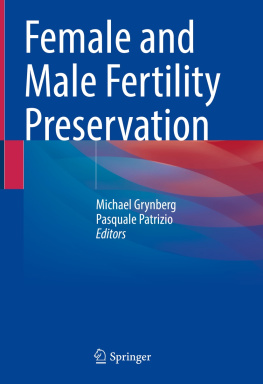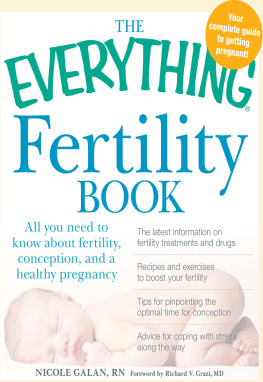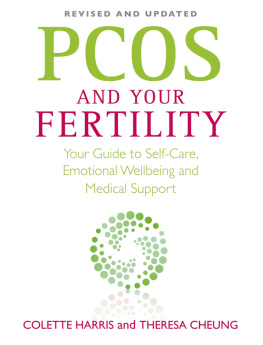Mire Sada - Divine Fertility
Here you can read online Mire Sada - Divine Fertility full text of the book (entire story) in english for free. Download pdf and epub, get meaning, cover and reviews about this ebook. year: 2020, publisher: Taylor & Francis Group, genre: Religion. Description of the work, (preface) as well as reviews are available. Best literature library LitArk.com created for fans of good reading and offers a wide selection of genres:
Romance novel
Science fiction
Adventure
Detective
Science
History
Home and family
Prose
Art
Politics
Computer
Non-fiction
Religion
Business
Children
Humor
Choose a favorite category and find really read worthwhile books. Enjoy immersion in the world of imagination, feel the emotions of the characters or learn something new for yourself, make an fascinating discovery.
Divine Fertility: summary, description and annotation
We offer to read an annotation, description, summary or preface (depends on what the author of the book "Divine Fertility" wrote himself). If you haven't found the necessary information about the book — write in the comments, we will try to find it.
Divine Fertility — read online for free the complete book (whole text) full work
Below is the text of the book, divided by pages. System saving the place of the last page read, allows you to conveniently read the book "Divine Fertility" online for free, without having to search again every time where you left off. Put a bookmark, and you can go to the page where you finished reading at any time.
Font size:
Interval:
Bookmark:

This book uniquely explores the impact of indigenous ideology and thought on everyday life in Northeast Africa. Furthermore, in highlighting the diversity in pre-Christian, pre-Islamic regional beliefs and practices that extend beyond the simplistic political arguments of the current dominant narratives, the study shows that for millennia complex indigenous institutions have bound people together beyond the labels of Christianity and Islam; they have sustained peace through cultural exchange and tolerance (if not always complete acceptance).
Through recent archaeological and ethnographic research, the concepts, landscapes, materials and rituals believed to be associated with the indigenous and shared culture of the Sky-God belief are examined. The author makes sense, for the first time, of the relationship between the notion of sacred fertility and a number of regional archaeological features and on-going ancient practices including FGM, spirit possessions, and other physically invasive practices and the ritual hunt. The book explores one of the most important pilgrimage centres in Somaliland and Somalia, the sacred landscape of Saint Aw-Barkhadle, founded ca. 1213th century AD. It is believed to be the burial place of the rulers of the first Muslim Ifat and Awdal dynasties in this region, and potentially the lost first capital of Awdal kingdom before Harar. This ritual centre is seen as a microcosm of the ancient Horn of Africa with its exceptional multi-religious heritage, through which the author lays out a locally appropriate archaeological interpretational framework, the Ritual Set, also applied here to the Ethiopian sites of Tiya, Sheikh Hussein Bale, Aksum and Lalibela, setting these places against a wider historical background of indigenous Sky-God belief.
This archaeological study of sacred landscapes, stelae traditions, ancient Christian and medieval Muslim centres of Northeast Africa is the first to put forward a theoretical and analytical framework for the interpretation of the shared regional heritage and the indigenous archaeology of the region. It will be invaluable to archaeologists, anthropologists, historians and policymakers interested in Africa and beyond.
Sada Mire is an award-winning Swedish-Somali archaeologist with a PhD from UCLs Institute of Archaeology. She is founder and executive director of Horn Heritage Organisation, an archaeology and heritage research institution with offices in the Horn of Africa and The Netherlands. Mire was the founding director of Somalilands Department of Archaeology until 2012 and since then has held academic positions at a several European universities including Leiden University. She has received a number of honours for her work, including being selected for lists such as New Scientists Most Inspiring Women in Science of All Times in 2016 and The Hay Festival of Literature and Arts list of 30 Global Thinkers and Writers. Mires popular contributions as well as commissioned features on her work appear regularly in the international media, such as the BBC, The Guardian, CNN and Channel Four, UK. At the moment, she is working on a book on Somali Heritage and Identity Conflicts.
Sada Mire grew up in the Horn of Africa and senses a continuity in sacred landscapes that cuts across space and time and the boundaries of states and religions. Her book provides a brave and bold conception of the regional system based on an almost forensic analysis of the evidence. Mire shows how the inclusion of material culture as evidence is central to understanding how continuities are created over time, but also how history can be masked at the same time as it is revealed. The argument is engrossing; chapter by chapter she builds up a convincing and absorbing argument for a discursive regional trajectory centred on the beauty and power of place curated over time by different faiths. The book illustrates the importance of location for symbolic action, knowledge and cultural memory, and the centrality of place as an entry point to understanding the deep past through an ongoing present. Underlying the history of the region is a syncretic trajectory, a multi-temporality, that is often challenged by fundamentalist positions but with an underlying structure that is centred on kinship deeply connected to a sacred landscape. As she concludes: From out of the womb of ancient indigenous and regional religions there has arisen a set of ideas reflected in practices, features and objects, all of which seem to connect the north and the west of the Horn of Africa with the south and the east. The book is an exceptional study of cultural memory in place; a rich encounter with the deep history of symbolic action, emotion and aesthetic affect.
Howard Morphy FASSA. FAHA.
Emeritus Professor Head of the Centre for Digital Humanities Research, Research School of Humanities and the Arts Author of, among other books, Ancestral Connections: Art and an Aboriginal System of Knowledge
This is a confident, masterly piece of work by somebody uniquely qualified to carry out the relevant research a remarkable and vivid book, which probably only Sada Mire (with her combination of theoretical proficiency in several academic disciplines and local intimacy) could have achieved. This is scholarly work, with a much wider general appeal.
Neal Ascherson,
Historian, journalist and writer, Formerly, The Observer, former editor of Public Archaeology Author of, among other books, The King Incorporated

UCL Institute of Archaeology Publications
General Editor: Ruth Whitehouse
Director of the Institute: Sue Hamilton
Founding Series Editor: Peter Ucko
The Institute of Archaeology of University College London is one of the oldest, largest and most prestigious archaeology research facilities in the world. Its extensive publications programme includes the best theory, research, pedagogy and reference materials in archaeology, cultural heritage and cognate disciplines, through publishing exemplary work of scholars worldwide. Through its publications, the Institute brings together key areas of theoretical and substantive knowledge, improves archaeological and heritage practice and brings archaeological findings to the general public, researchers and practitioners. It also publishes staff research projects, site and survey reports, ethnographic work and conference proceedings. The publications programme, formerly developed in-house or in conjunction firstly with UCL Press and then with Left Coast Press, is now produced in partnership with Routledge, a part of the Taylor & Francis group. Details of the Institutes 80-plus publications can be found at https://www.routledge.com/series?title=institute+of+archaeology.
The Institutes publications programme consists of two series: a General Series, reflecting the Institutes wide-ranging archaeological research; and a Critical Cultural Heritage Series, promoting research that differs radically from the existing canon of cultural heritage texts.
This volume is part of the Institutes General Series.

UCL Institute of Archaeology can be accessed on line at www.ucl.ac.uk/archaeology.
Font size:
Interval:
Bookmark:
Similar books «Divine Fertility»
Look at similar books to Divine Fertility. We have selected literature similar in name and meaning in the hope of providing readers with more options to find new, interesting, not yet read works.
Discussion, reviews of the book Divine Fertility and just readers' own opinions. Leave your comments, write what you think about the work, its meaning or the main characters. Specify what exactly you liked and what you didn't like, and why you think so.

